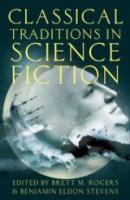
OUP (2015) p/b 380pp £22.99 (ISBN 9780190228330)
This ambitious edited volume is part of OUP’s ‘Classical Presences’ series, which aims to bring the latest scholarship to bear on the contexts, theory and practice of use of the classical past to authenticate the present. In other words, these are studies in Classical Reception, a burgeoning field with (thankfully) a wealth of Companions and Handbooks to guide the uninitiated through it.
The focus of this particular volume is SF: shorthand for science fiction, but also denoting more broadly ‘knowledge fictions’ that depart from a prevailing epistemology. What makes the volume interesting for both sci-fi fans and classicists (and those who can profess to be both) is that it addresses not only how modern SF receives antiquity, but also how certain ancient works can be considered ‘knowledge fictions’ in their own right. One text mentioned often in this sense is Lucian’s True History: an extraordinary story which exhibits all the traits of SF, and which has found in this volume a perfect forum.
Fourteen chapters and an introduction are organised into four Parts, with an overarching chronological structure ordered by the SF sources, beginning from Johannes Kepler’s Somnium and Mary Shelley’s Frankenstein and stretching to Suzanne Collins’s Hunger Games trilogy and Jonathan Hickman’s Pax Romana comic. As these few examples suggest, both well-known and lesser-known (at least by this reviewer) works of SF are tackled, and much the same goes for the classical material, with Homer and Virgil no doubt being more familiar to most readers than Lucan and Lucian. At least a passing knowledge of the sources is presupposed (the book is intended for scholars and sci-fi fans), but the methodological transparency of chapters and introduction helps orientate the reader.
Though the volume comprises an astoundingly diverse array of case studies, the introduction makes clear a uniting rationale. SF presents a compelling paradox: it is a way of thinking about modern life, but it is also a site of significant classical receptions. The volume begins to address this paradox by showing how SF raises questions about what it means to be human today (that is, whenever the sources were composed), and by highlighting such questions as a crucial part of studying or working in the humanities. Moreover, SF and classical sources are brought together as texts that are enticingly incomplete—in both cases, the reader has to supply missing information, as the world depicted does not (yet; any longer) exist outside of the text.
Hardback publication (£64, February 2015) was quickly followed by a paperback version (March 2015), making this a very affordable book. It does not profess to be an exhaustive study of the topic, but the range of examples discussed (both ancient and modern) means that it surely has something for everyone.
Dr Lilah Grace Canevaro—The University of Edinburgh
